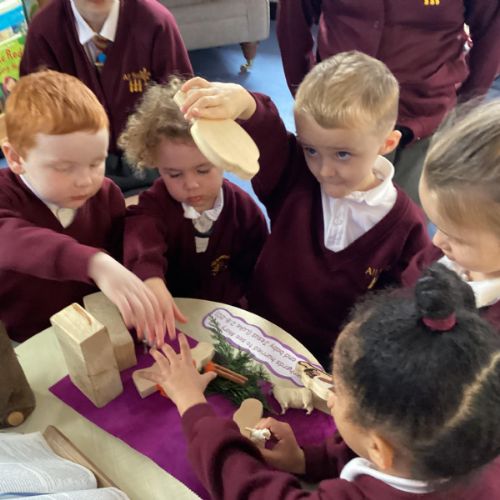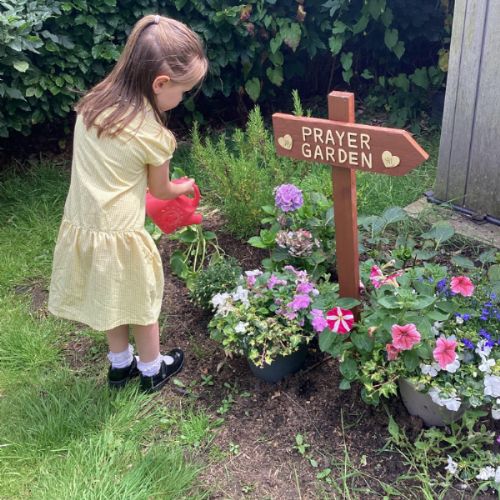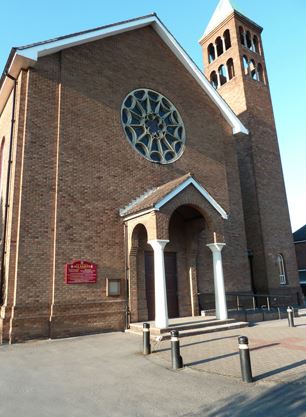Religious Education
"To Know You More Clearly."
"Education is not about knowing things or taking lessons but about being able to use three lingos: those of the head, the heart, and the hands... learning so that you can think about what you feel and do, can feel what you think and do, and can do what you feel and think. Unity within a person."
– Pope FranciS
All Saints’ was described as an “Outstanding Catholic school where everyone receives a warm welcome” during our last RE inspection (2019). The inspector went on to say “The Pupils show great respect for one another, to adults around them and to visitors to the school. Their behaviour is outstanding. They show high levels of religious literacy and are able to show a mature attitude to sensitive issues.”
The Aims of Religious Education
At All Saints’, we understand Religious Education to be the systematic study of the mystery of God, of the life and teachings of Jesus Christ, the teachings of the Church, the central beliefs that Catholics hold, the basis for them and the relationship between faith and life;
- to enable pupils continually to deepen their religious and theological understanding and be able to communicate this effectively;
- to present an authentic vision of the Church’s moral and social teaching to provide pupils with a sure guide for living and the tools to critically engage with contemporary culture and society;
- to give pupils an understanding of the religions and worldviews present in the world today and the skills to engage in respectful and fruitful dialogue with those whose worldviews differ from their own;
- to develop the critical faculties of pupils so to bring clarity to the relationship between faith and life, and between faith and culture;
- to stimulate pupils’ imagination and provoke a desire for personal meaning as revealed in the truth of the Catholic faith;
- to enable pupils to relate the knowledge gained through religious education to their understanding of other subjects in the curriculum

At All Saints’, we understand Religious Education to be the systematic study of the mystery of God, of the life and teachings of Jesus Christ, the teachings of the Church, the central beliefs that Catholics hold, the basis for them and the relationship between faith and life;
- to enable pupils to continually deepen their religious and theological understanding and be able to communicate effectively;
- to present an authentic vision of the Church’s moral and social teaching; to provide pupils with a sure guide for living and the tools to critically engage with contemporary culture and society;
- to give pupils an understanding of the religions and worldviews present in the world today and the skills to engage in respectful and fruitful dialogue with those whose worldviews differ from their own;
- to develop the critical faculties of pupils so to bring clarity to the relationship between faith and life, and between faith and culture;
- to stimulate pupils’ imagination and provoke a desire for personal meaning as revealed in the truth of the Catholic faith;
- to enable pupils to relate the knowledge gained through religious education to their understanding of other subjects in the curriculum
Curriculum Intent
At All Saints’ school, we will foster the growth of faith by providing a caring, secure and stimulating learning environment which: values the contribution of each individual; promotes the love of God and of one another and of a life in which we are fulfilling our mission statements.
We will provide opportunities to help our children develop the skills and capacities necessary to become reflective and questioning individuals and to promote knowledge and understanding of the Catholic faith.
Religious Education permeates all that we do at All Saints’. It is at the heart of our curriculum as we strive to live and proclaim the Gospel values. In proclaiming the Gospel message, we endeavour to share the Gospel spirit of love in all that we do. We teach that ‘God is love’ but our understanding of this concept can only grow from our own experiences of kindness, forgiveness and working together. Therefore, every effort is made to create, in our school and in our classrooms, a community where the children know they are loved and feel confident and secure.
Through our teaching of Religious Education, we endeavour to enrich the lives of the individuals in our school.
Religious Education is a core subject in our Catholic school and because of this it is planned, taught, assessed and monitored with the same rigour as other curriculum subjects.
Our Catholic Social Teachings, bespoke to All Saints’ but inspired by the Church, runs through our curriculum. The spiritual, moral, social and cultural development of each child is addressed through all aspects of the curriculum as well as through everyday school life.
We see our role, in partnership with parents, in leading their children to a greater understanding of who God is and developing a deeper faith.
’RE plays a central and vital part of the faith of the Catholic School. At the heart of Catholic Education is the Christian vision of the human person. RE is never simply one subject amongst many, but the foundation of the human process.’ (Bishops’ statement 2000)
At All Saints’, we believe that ‘The primary purpose of Catholic Religious Education is to come to know and understand God’s revelation, which is fulfilled in the person of Jesus Christ… In the person of Christ, the deepest meaning of what it is to be human — that we are created by God and through the Holy Spirit united with Christ in his Incarnation — is discovered. This revelation is known through the scriptures and the tradition of the Church as taught by the Magisterium. Religious Education helps the pupil to know and experience the meaning of this revelation in his or her own life and the life of the community which is the Church.’( Bishops’ Conference, 2000)
For some in the classroom, Religious Education may well be received as catechesis, deepening and enhancing their personal faith; for some it will be evangelisation, the first time they will have been presented, personally, with the truths of living faith. Nevertheless, its primary purpose is the step-by-step study of the mystery of Christ, the teaching of the Church and its application in daily life. The criteria by which it is to be judged are educational. ( Bishops’ Conference, 2000)
The outcome of Religious Education is religiously literate and engaged young people who have the knowledge, understanding and skills – appropriate to their age and capacity – to reflect spiritually, and think ethically and theologically, and who are aware of the demands of religious commitment in everyday life. (Religious Education Curriculum Directory p6)
Curriculum Implementation
R.E. is a core subject in our school, alongside English, Maths and Science, and therefore we devote 10% of our curriculum time to its delivery. At All Saints' Religious Education is carefully planned and delivered to reflect our deep commitment to nurturing faith, love, and understanding in every child. Our teaching is rooted in the RED (Religious Education Directory) and we have gradually introduced this through The Vine and the Branches scheme. As a school dedicated to shaping high-quality RE, we were proud to volunteer as a pilot school for the new RED scheme in 2023 in year groups one and three. This early involvement has enabled us to embed the curriculum with confidence, ensuring a rich, progressive and theologically sound RE experience. Planning is detailed and there is a sharp focus on knowing and understanding religious vocabulary. Teaching ensures that there are regular planned opportunities to re-visit, review and consolidate prior learning. In classrooms, you will see RE working walls displaying key vocabulary and current learning. There is a consistent approach to re-visiting learning from previous units throughout the school. Lessons are thoughtfully sequenced, incorporating scripture, liturgy, doctrine, and Catholic social teaching, while encouraging critical thinking, spiritual reflection, and active engagement with faith in action.
This academic year, all children will be taught using 'The Vine and Branches'.
The ways of knowing describe the skills that pupils develop as they progress through the religious education curriculum. We refer now to ways of knowing rather than standards or levels, since progress in religious education is not only something that concerns performance and summative assessment. They are called ways of knowing since they describe the holistic ways human beings experience education: as a growth in understanding, as a creative and critical assimilation, and as a recognition of the application of learning to one’s own life. The three ways of knowing are ‘understand’, ‘discern’, and ‘respond’.
Curriculum Impact
At All Saints’ Primary School, the teaching of Religious Education (RE) enables pupils to acquire a deep and meaningful understanding of faith, identity, and the diverse world around them. The impact of our RE curriculum is reflected in the way children grow in their knowledge, empathy, and ability to articulate their thoughts respectfully and confidently.
Development of Knowledge, Skills and Concepts
Pupils progressively build their understanding of religious beliefs, practices, and worldviews, fostering a respectful appreciation of the different ways people live and express their spirituality. Through engaging and reflective learning experiences, children explore key theological concepts and are encouraged to make connections between religious teachings and their own lives. This supports them in developing critical thinking, informed discussion, and the ability to reflect on moral and spiritual questions.
Personal, Social and Cultural Awareness
RE helps our children develop a strong sense of identity and belonging by making meaningful links between their own experiences and the lives of others—both within the school community and globally. By exploring a range of religious and non-religious worldviews, children grow in their cultural awareness and emotional intelligence, becoming more compassionate, open-minded and respectful individuals.
Assessment and Evidence of Impact
The impact of RE learning is monitored through lesson observations, pupil voice, and regular book scrutiny. However, the evidence of pupil understanding goes beyond written work. Children demonstrate their learning through creative expression—such as art, drama, and role-play—as well as through discussions and personal reflections. This holistic approach ensures that all pupils are able to access and express their RE learning in a way that is meaningful to them.
Collaborative Enrichment and Shared Practice
We value the strength of collaboration and regularly work in partnership with other schools, particularly those within our parish community. This allows us to share excellent practice, enrich our curriculum provision, and ensure consistency and high standards across settings. Through these shared experiences, our children are empowered to fulfil their spiritual, moral, and academic potential.
Leadership of Religious Education
Religious Education is the responsibility of the R.E. Lead and the Headteacher with support from Key Stage Leaders. Their role is to monitor and assess the R.E. curriculum and Catholic prayer and liturgy throughout the school to ensure continuity and progression. They also ensure that the aims and learning outcomes in the Curriculum Directory are identified and fulfilled. A link governor has specific responsibility for R.E. and liaises closely with the staff of the school to fulfil their monitoring duties.


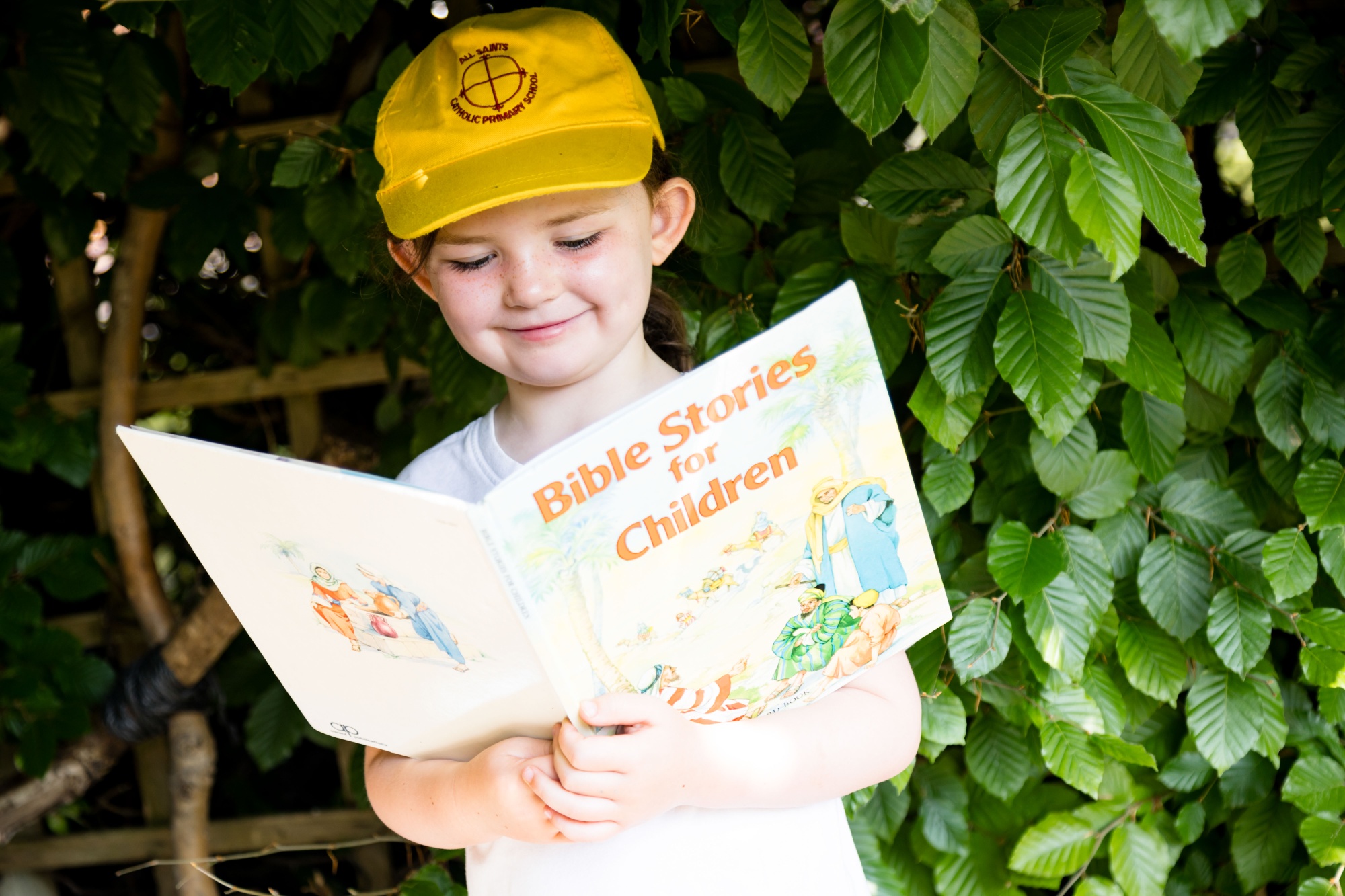
The Role of the Lead for Religious Education
The Religious Education Lead will be responsible for:
- Working with senior leaders and monitoring teaching and learning, planning and standards through lesson observations and work scrutinies according to school practice.
- Organising in-house moderation of standards meetings.
- Self-evaluation to identify strengths and areas for development.
- Ensuring the curriculum offered is appropriate, suitable and relevant to pupils’ needs and interests.
- Attending appropriate training and keeping up to date with current thinking, policy and developments and feeding back to staff.
- Organising and leading in-house staff training and development.
- Identifying training needs of staff to ensure their suitability to teach effective Religious Education.
- Supporting and advising colleagues in the delivery of Religious Education.
- Liaising with the Headteacher, Governors, parents, the Education Service on matters relating to Religious Education.
- Auditing, managing and developing resources within a given budget.
Curriculum Content
R.E. is a core subject in our school, alongside English, Maths and Science, and therefore we devote 10% of our curriculum time to its delivery. At All Saints' Religious Education is carefully planned and delivered to reflect our deep commitment to nurturing faith, love, and understanding in every child. Our teaching is rooted in the RED (Religious Education Directory) and we have gradually introduced this through The Vine and the Branches scheme. As a school dedicated to shaping high-quality RE, we were proud to volunteer as a pilot school for the new RED scheme in 2023 in year groups one and three. This early involvement has enabled us to embed the curriculum with confidence, ensuring a rich, progressive and theologically sound RE experience. Planning is detailed and there is a sharp focus on knowing and understanding religious vocabulary. Teaching ensures that there are regular planned opportunities to re-visit, review and consolidate prior learning. In classrooms, you will see RE working walls displaying key vocabulary and current learning. There is a consistent approach to re-visiting learning from previous units throughout the school. Lessons are thoughtfully sequenced, incorporating scripture, liturgy, doctrine, and Catholic social teaching, while encouraging critical thinking, spiritual reflection, and active engagement with faith in action.
This academic year, all children will be taught using 'The Vine and Branches'.
The ways of knowing describe the skills that pupils develop as they progress through the religious education curriculum. We refer now to ways of knowing rather than standards or levels, since progress in religious education is not only something that concerns performance and summative assessment. They are called ways of knowing since they describe the holistic ways human beings experience education: as a growth in understanding, as a creative and critical assimilation, and as a recognition of the application of learning to one’s own life. The three ways of knowing are ‘understand’, ‘discern’, and ‘respond’.
The Catechism of the Catholic Church
The Catechism of the Catholic Church provides an excellent topic index which will assist teachers’ own understanding of the faith. This is for teachers to use as a resource.
Planning
Before each topic, every teacher looks at the aims, understanding and learning intentions of the theme and topic and plans accordingly. Lessons may also incorporate important dates in the Liturgical Calendar. A copy of the plan is given to the RE coordinator on request for monitoring and observation to ensure continuity and progression throughout the topics covered.
In each classroom there is an area which displays religious topics covered at that time of year. There are also Religion displays in the foyer and school corridors.
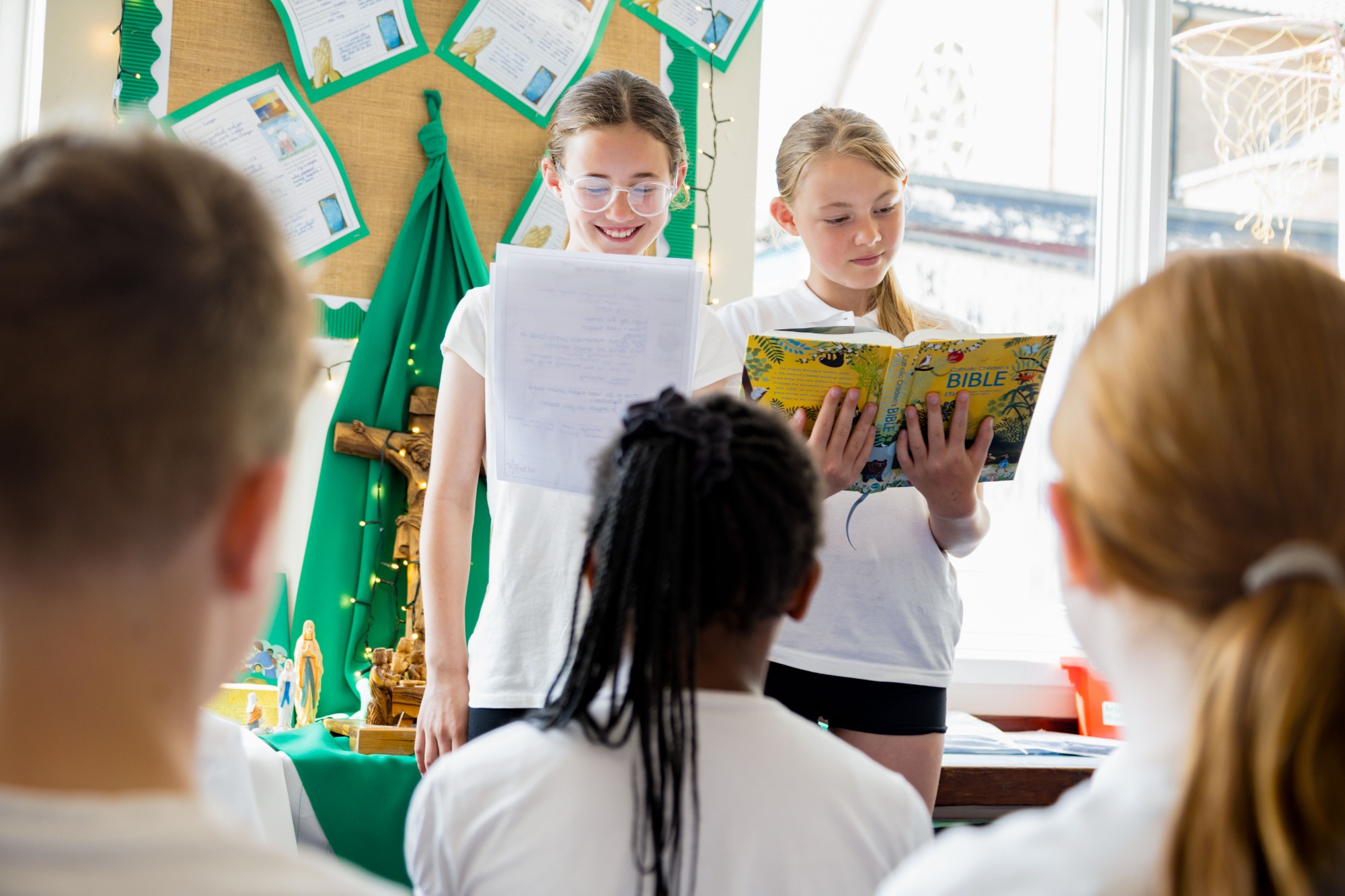
Assessment and Monitoring
At All Saints’, Assessment for Learning in Religious Education is fundamental to supporting children on their journey of faith and helping them fulfil their God-given potential. It enables teachers to identify each child’s progress in religious knowledge, understanding, and spiritual development, ensuring that RE is meaningful, responsive, and personalised.
Assessment in RE is both formative and reflective and takes place daily. It provides children with varied opportunities to demonstrate their religious literacy and to show how they live out Gospel values in their everyday lives. From Nursery to Year 6, a wide range of assessment strategies is used, including:
- Ongoing verbal feedback and reflective dialogue to deepen pupils’ understanding
- Class discussion, questioning, problem-solving, and opportunities to present their understanding through activities such as morning liturgies
- Retrieval and reflection activities, such as low-stakes quizzing, scripture journaling, and guided class discussions
- Regular opportunities for pupil voice to explore how RE shapes their beliefs, values, and actions
- Daily formative assessment to inform next-step planning and respond to learners’ needs
- Monitoring of RE through planning scrutiny, book looks, and learning walks to ensure coherence, progression, and impact
- In EYFS, RE observations are recorded in the class ‘Big Book’ and an Individual book to capture children’s spiritual experiences and reflections
In addition, teachers assess pupils’ knowledge and understanding at the end of each half term. Judgements are based on age-related expectations using two key descriptors: WTS (Working Towards the Standard) and EXS (Expected Standard), rather than using levels or sub-levels.
Parents are kept informed about RE themes, liturgical events, and curriculum content through half-termly newsletters. During parents’ evenings, teachers provide detailed updates on each child’s progress in RE, and an annual written report summarises attainment and spiritual development. Homework may occasionally include faith-based tasks to encourage further reflection and prayer at home.
The RE Lead plays an active role in the Romero Hub, a network of local Catholic schools that supports collaboration, moderation, and the sharing of best practice among RE Coordinators. Strong partnerships are also maintained with the RE Leads at St Margaret Ward and Our Lady of Lourdes, forming part of a parish cluster supported by our parish priest. These collaborative links ensure continuity, shared mission, and mutual support across our faith community.
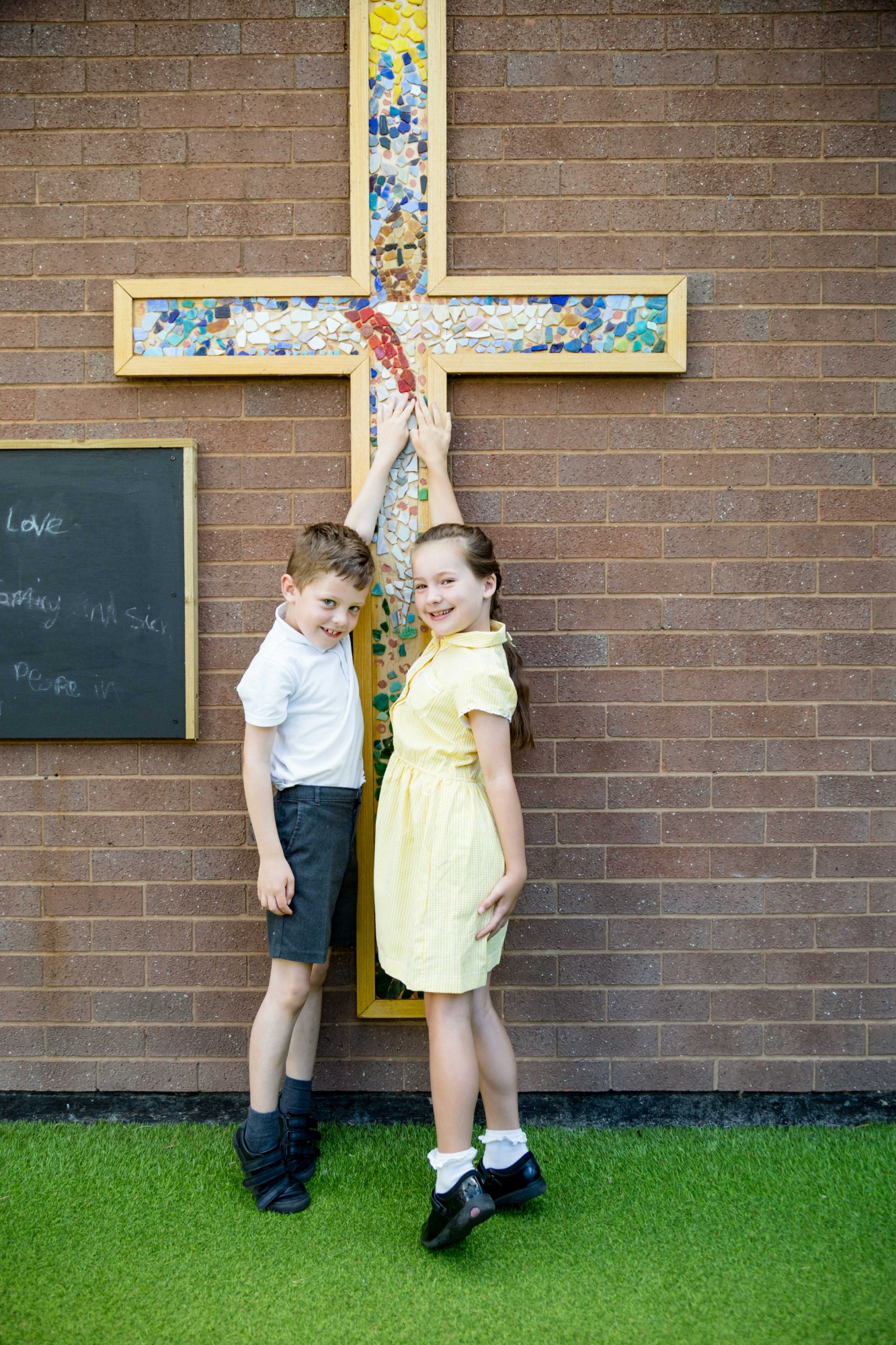
Marking
In line with the school's marking policy, marking of children's religious work should always be positive and supportive to encourage the child in his/her faith journey. Marking will focus upon religious content and comments, feedback and next steps given will look to enhance religious skills, knowledge and understanding, rather than Literacy skills of spelling, grammar and punctuation. However, inaccurate spelling of important religious key words will be corrected within the children’s books.
Vocabulary
Key words and vocabulary will be displayed prominently in the classroom and in books, children will be encouraged to use these effectively and purposefully throughout each lesson, particularly in their written work.
Home Links
The school recognises that it cannot teach our children without the cooperation of the parents and the parish. The parents/guardians are the first educators and they support the teachers who have the professional skills and training to help parents in the task of teaching the Catholic faith. We endeavour to do this in an atmosphere of trust and confidence. During the year, parents and friends are invited to join us at many celebrations. Parents are always invited and welcomed to all our school and class celebrations which include school Masses, class Masses, stay and pray sessions, Christmas and Easter productions and morning prayer sessions. Class teachers detail each Religious branch or unit in half termly topic webs or newsletters to keep parents informed.
Parish Links and the Wider Community
We recognise that the school stands in the midst of the local community. At parish level, we take an active part in the parish life of the church.
All staff participate in First Holy Communion Mass and First Forgiveness Service led by the RE Lead.
Sunday Community Masses are planned by the RE Lead and led by the children. Children, families and staff also attend Masses such as the Sunday ‘Blessing of the school bags’and the Y6 Leavers Mass
In addition, classes from Reception, KS1 and KS2 plan and attend regular Masses at church throughout the year and on Holy Days of Obligation. The parish priest, Father Ned is a governor of the school. He promotes the spiritual life of the school and leads the celebration of liturgies, Mass, penitential services, and the other liturgical feasts and celebrations during the year. He also teaches pupils the traditions and rituals of the church and the church is often used for such lessons.
All Saints’ School is part of a community- home- parish- local – wider.
Children and their families are encouraged to be aware of the wider community at every level. Regular newsletters inform parents and carers about their children’s RE topics. Parents and carers are informed of all school celebrations, including Masses and morning liturgy sessions. Parents are invited to participate in events such as the Holy Week trail and Crowning of Our Lady. Families pray at home, using the Lenten and Advent prayer boxes. Families are involved in donating food for the local Sale West food bank and toys for the Manchester Wood Street Mission project. The Sacramental Programme strengthens the links with families, as school leads the programme and are involved at every stage. At All Saints, the children are invested in the local community- for example - singing at local care homes and in the village and giving hampers to the housebound during Advent. Mini Vinnies positively promote their message of ‘Turning concern into action’, through their events. New opportunities to make positive links locally, are always being investigated.
The school’s website and Twitter feed also share the integral role of RE in our daily lives.
Led by our Faith in Action group- Supporting our global community takes place through fund raising, for example for CAFOD. All Children are encouraged to ‘live’ their Faith, through various events, such as fundraising for CAFOD and Missio by being aware of world events. Children are informed through learning about global concerns as part of the curriculum, visitors to school, educational resources from CAFOD and Mission Together and Laudato Si.
Catholic Social Teaching in the Life of All Saints’ School
Catholic Social Teaching (CST) is central to the Religious Education and wider mission of our school, underpinning the values we seek to cultivate in every pupil. Rooted in the Gospel and the dignity of the human person, CST invites children to live out their faith through action, compassion, and justice. At All Saints’, we embed these teachings through liturgical seasons, feast days, and practical faith-in-action projects that shape pupils as responsible citizens and followers of Christ. Themes such as Stewardship, the Preferential Option for the Poor, Human Dignity, and Solidarity are lived experiences across the year—whether through environmental stewardship in our eco garden, caring for the vulnerable via food drives and Christmas hampers, or promoting peace and participation through leadership roles and community prayers. These values not only deepen children’s spiritual development but also equip them to engage with the world in a meaningful and loving way, inspired by the example of Jesus Christ and the Saints. See RE Provision Map
Prayer and Liturgy (See P&L Policy)
To love You more dearly – The Prayer and Liturgy Directory for Catholic Schools and Academies in England and Wales.
The aim of the Prayer and Liturgy Directory (PLD) is to assist school communities in their endeavours to implement the vision of the Church for prayer and liturgy within their local setting. An essential part of the Catholic ethos of the school is the prayer life. The most important aspect of prayer for children is that they realise it is their way of communicating with God. Children are encouraged to pray in different ways according to their age and personal development. We have developed a prayer progression model for children as they move through the school. Children are introduced to a variety of different ways of praying:
- quiet reflection / meditation
- praying together
- writing own prayers
- prayers through music
- learning traditional Christian / Catholic prayers
Staff are encouraged to pray with children, and to be an example for them. Through prayer, we endeavour to develop our relationship with God. All classes have a prayer area which has displays of children's work. This area changes with the liturgical year. School and Common prayers are established throughout the school and each teacher uses prayers set within their specific Key Stage bracket, as identified by the PLD. Further opportunities for prayer are used through our weekly Celebration of the Word gathering as a whole school, as well as using this to reinforce the common prayers expected to be known throughout the school. Candles, pictures and objects are also used as a focus for prayer. Children lead and take part in whole school prayer sessions where children and staff join together to pray. Children are encouraged to pray their own prayers. Children and families are invited to a weekly liturgy session that takes place before school on a Friday morning. This session is led by a class each half term.
Each class has their own prayer book. During Advent and Lent, a special Prayer Bag is sent home to a different family each night. EYFS enjoy taking home ‘Prayer Bear’ to spend time with them at home. Reception children are given a special prayer book that stays with them throughout their school journey. The children add to this prayer book each year with their own intentions.
Prayer
An essential part of the Catholic ethos of the school is the prayer life. We acknowledge the legal requirement that there must be a daily act of worship for all pupils. The act of worship is distinct from R.E. lessons. It forms an integral part of school life and is central to Catholic tradition. Staff meetings and Governor’s meetings begin with a prayer. The most important aspect of prayer for children is that they realise it is their way of communicating with God. Pupils are encouraged to prepare and lead Prayer sessions in their classrooms and for whole school gatherings. The Year 6 Chaplains model and promote their role as prayer ambassadors seriously.
Staff are encouraged to pray with children, and to be an example for them. Through prayer, we endeavour to develop our relationship with God.
All classes have a prayer focus area which has displays of children's work. This area changes with the liturgical calendar and is prepared to reflect the appropriate liturgical colour. Class prayers are established throughout the school and each teacher uses prayers appropriate to age and ability of the class. A bible should be on display. Each classroom should also have a crucifix as a focal point. Candles, pictures and objects are also used as a focus for prayer. Prayer areas are also found in other areas of the school. Children are also encouraged to take time to reflect and pray. The school prayer garden is a special area used for individual and group prayer, including use by the school prayer group and Mini Vinnies
Children take part in whole school Celebration of the Word assemblies where children and staff join together to pray. Children are encouraged to pray their own prayers. Classes have daily / weekly acts of prayer and worship including pupil-led liturgy.
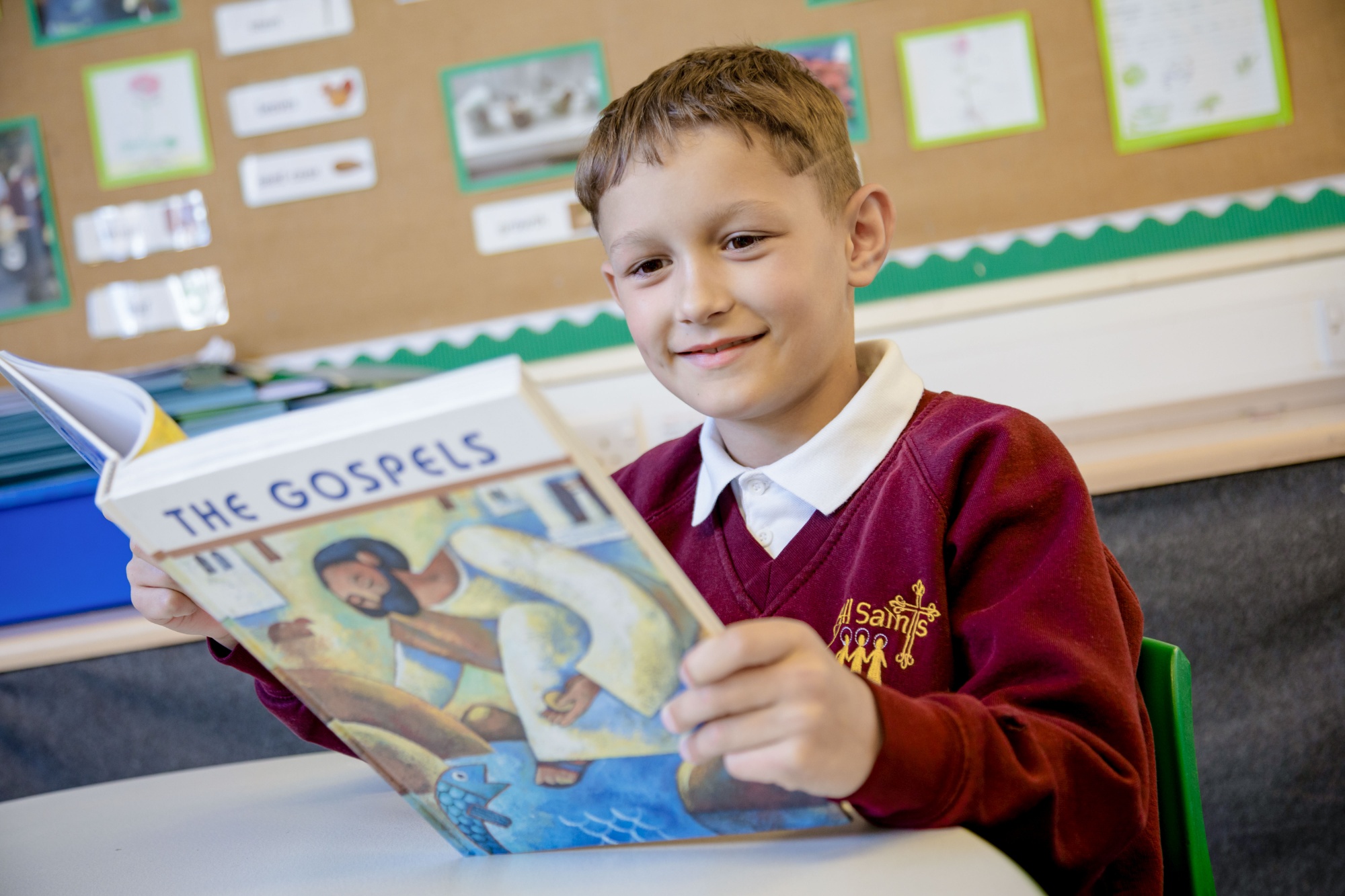
Assembly
Celebration of the Word take place weekly led by the head teacher or deputy head
A weekly celebration assembly is also used as an opportunity to reflect on the school’s mission statements and celebrate how the children have ‘lived’ or seen the mission statements in action during the week.
Mass
Mass is an integral part of school life. Each class, throughout the school, leads Masses. Whole school Masses are also planned, which involve the participation of some children from all classes. All Masses take place in church. Families and parishioners are invited to Masses. All are invited back to school for refreshments, after Mass.
Year 6 Chaplains help teachers organise Mass resources. Y6 school leaders organise hymn books, sit with younger children and the Performing Arts group lead children in singing.
Holy Days of Obligation and special feast days are always honoured.
Special events are celebrated with Holy Mass- such as Year 6 Leavers’ Mass, staff retirement Masses.
Events during the Liturgical Year are also celebrated through services which take place in church and school. These include:
House Saints’ Feast Days
- Harvest/ CAFOD
- October Rosary
- Advent
- Christmas
- Lent/CAFOD
- Stations of the Cross
- Holy Week
- Easter
- Ascension
- Pentecost
- Crowning Our Lady
- May Rosary
- Sacred Heart


